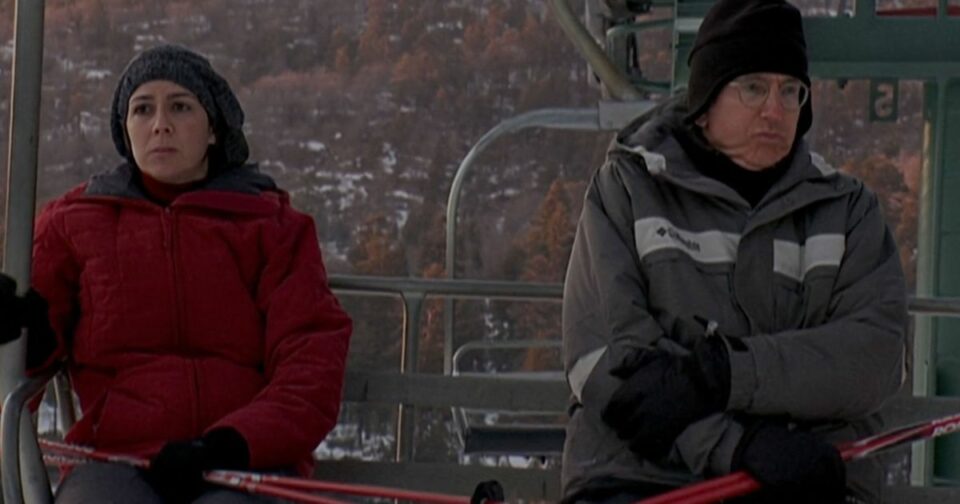
About a year ago, I decided to take an edible for the first time in nearly a decade, pick up a burger from In-N-Out, and turn on Curb Your Enthusiasm. Twenty minutes later, I found myself crying — sobbing, really. Yes, there were tears of laughter, but it was deeper than that: Larry David had touched my soul. The triggering moment in the show was a mundane one — it had nothing to do with politics or history or culture or anything important. It was Larry David attempting to get comfortable on a daybed, inching back and forth for a painfully long minute, that made me break down. There was something about his mannerisms that brought me so much … solace.
This is what I’ve always liked about Curb.It’s less the outrageous plotlines and more the tedious interactions that get to me: Larry David complaining about feeding pet fish, or trying to identify the material of a friend’s sweater until they get into a physical altercation, or insisting on his right to whistle the tunes of Richard Wagner, despite Wagner being a Nazi (“I do hate myself, but it has nothing to do with being Jewish”). In every interaction, he makes humor out of a slight but persistent uneasiness he feels trying to navigate acceptable behavior. It’s an uneasiness that feels familiar, and familial, to me.
Growing up in New York, I thought about 20 percent of the world was Jewish until embarrassingly late in life. Only when I was 15 or 16 did I realize it was much, much, much, much less than that (currently we’re about 0.2 percent of the world population), so during my childhood, I took the cultural specificity of my life for granted. I’m of a different generation than Larry David, but I was raised with the same unnerving sensation of being part of a larger world and othered from it simultaneously. I grew up seeing the numbers tattooed on my bubbe’s arm, a constant reminder of our very recent and unbelievably violent history, while at the same time experiencing many of the privileges of whiteness in America, and it was … strange. It created a kind of split consciousness — a constant awareness of the cruelty and hypocrisy just under the surface of daily life.
Assimilation is an uncomfortable thing. It wasn’t until leaving the city behind for college, then coming back as an adult, that I realized the culture I’d grown up in no longer really existed — that people with Bernie Sanders–esque accents and a joyfully cynical outlook on the world were dying out. That’s why watching Curb, or any Larry David creation, feels bittersweet to me. There’s a reminder delivered in every line of dialogue spoken by David — in his inflection and his hocking people a chinik, and his mannerisms — of where I come from, and a reminder of what soon will no longer be.
This is the final season of Curb Your Enthusiasm. David has claimed the show is ending before. But this time around, there are other factors: Richard Lewis, one of David’s best friends and a staple of the show, died this year, and David has said he’s old and he’s ready. I believe him — not just because of his age, but because Curb itself feels a bit … old. Not necessarily staid, not boring, but of an era that is ending, or, I guess, will end as soon as the show does. If Larry David’s other long-running creation, Seinfeld, was the popular peak of American Jewish comedy, Curb is its beautiful swan song.
For me, both of these shows felt like being home — yes, in an emotional sense, but often in a very literal one too. It was watching an episode of Seinfeld, not even a particularly popular one, that I felt seen by a TV show for the first time: In the third episode of season three, “The Pen,”Jerry is in Florida, visiting his parents in a retirement community, with Elaine tagging along. In that little condo, which had a remarkably similar layout to my grandma’s Fort Lauderdale retirement apartment, it was as if I was reliving conversations I’d seen play out between my parents and grandparents. It had the nagging, the insistence that no one was being bothered even as people were clearly being bothered, even Jerry’s mom’s claim that she never felt hot without the air conditioner (my grandma used to say the exact same thing).
It only occurred to me recently that my lifelong love of comedy on television was in its ability to make me feel at home in this way, and that’s largely because of its Jewishness. For decades, American comedy was, essentially, Jewish American comedy. In 1978, Time magazine estimated that 80 percent of America’s professional comedians were Jewish. Time gave several possibilities as to why: Jews used comedy to ward off the antisemitism of America. Or Jews gravitated toward comedy to deal with the trauma of the Holocaust. As Joan Rivers once said, the article notes, “If I were marching to the ovens, I’d be telling jokes all the way.”
These explanations ring partially true, but I also think Jewish comedy has been used as a coping mechanism, and as a tool, during Jews’ assimilation into whiteness. Larry David seems to get this unique position like no one else, and it’s in season five of Curb that he addresses it most directly. A large part of the season involves Larry grappling with his Jewishness. In the eighth episode, he realizes he might be able to get Richard Lewis a kidney if he pretends to be much more steeped in Judaism than he actually is, because the head of the “kidney consortium” is an Orthodox Jew. Larry plays up not only his religion but also all the mannerisms associated with Jews and Jewish comedy. He acts exceedingly nebbish; he pretends he was once in a Jewish folk band that played songs such as “My Freaking Back Is Killing Me and It’s Making It Hard to Kvell.” The ploy, of course, falls apart — David can only pretend to be a real Jew for so long before his true identity as just another Jew-ish guy in L.A. is revealed. (When the Orthodox daughter of the head of the kidney consortium says she’d rather jump off a broken-down ski lift than be trapped on it with a man she’s not married to past sundown, David replies, “What are you, fucking nuts?”)
At the end of the season, Larry comes to believe he was adopted and was actually born a Christian. As soon as he realizes this, he drops, basically, his Jewishness — his constant critique of others, his complaining, his animosity toward any perceived hypocrisy, and his cynical humor. Instead, he becomes … normal: He joyfully goes to church service and sings with his full chest and a smile of sincerity on his face; on a flight, instead of complaining to the attendant about being seated in an emergency-exit row, he says, “You can count on me.” It’s through his temporary foray into un-Jewishness that David reveals American Jewishness to run perpendicular to polite society, and that its comedy comes from that (his newfound goyishness is funny only in its temporariness; no one would want to watch a comedy show about someone who is agreeable, amicable, and sincere all the time). To become fully white is to lose touch with what makes Larry David Larry David, and what makes him funny, which, to a large extent, is being Jewish.
But the depths of Jewish angst, otherness, and grievance have been mined for comedy for so long, it was inevitable that this specific brand of humor would run out of steam eventually. It’s not just that one can only make the same kind of jokes so many times, it’s that the culture those jokes were based in now seems irrelevant. Which could be why this last season of Curb, as much as I hate to admit it, has felt tired. David no longer strikes me as a comedic representation of the discomfort inherent in assimilation. He has fully assimilated into his white-guy-in-L.A.-ism. There are several dated Trump jokes, for example, that read less like the kinds of takes one has from a lifetime of existing uncomfortably in white society, and more like the kinds the other side of Larry David — white, rich, powerful, liberal in a milquetoast way — would make.
But, perhaps, it’s also that I need more. I used to find solace in the mundane discomfort of American Jewish life represented onscreen, but Jewish life now is much more charged. As I watch a state carry out war crimes in the name of my family and our history, the kind of one-foot-in-one-foot-out of power and whiteness represented by so much of Jewish comedy, including Curb, feels insufficient to me. It’s not so much that Curb has changed; it’s that it’s stayed the same as the reality of being Jewish has transformed. It is no longer enough to make light of our slight otherness; we’re at a place of full and difficult confrontation with our complicity. Watching Curb or Seinfeld these days feels less comforting, less like home, because being home these days often feels less comforting. There’s too much arguing — and not the fun, bickering, uniquely Jewish kind — and there’s too much grief. For me at least, in reality and in depictions of it, there’s much less to laugh about.
By P.E. Moskowitz , 2024-04-05 17:00:07
Source link


